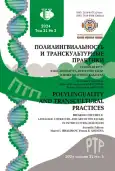Preserving the National Identity of the Original Text in Translation (on the Material of Translations of Tatar Poetry into Russian)
- Authors: Nagumanova E.F.1
-
Affiliations:
- Kazan Federal University
- Issue: Vol 21, No 3 (2024): BREAKING THE CIRCLE: LANGUAGE, LITERATURE, AND ART OF THE TATARS IN INTERCULTURAL DIALOGUES
- Pages: 535-546
- Section: Theory of Translation
- URL: https://journal-vniispk.ru/2618-897X/article/view/326920
- DOI: https://doi.org/10.22363/2618-897X-2024-21-3-535-546
- EDN: https://elibrary.ru/KYZCBD
- ID: 326920
Cite item
Full Text
Abstract
The relevance of the study is explained by the growing interest in the problems of translation from national languages in modern Russia. The level of translation depends primarily on the translator’s understanding of the cultural features of the nation the author belongs to. The research is based on Tatar poets’ poems of the late 20th - early 21st century and their translations into Russian. The study is aimed at determining the means of adequate conveying of the Tatar poets’ ethnic identity through different layers of the text (lexis, syntax, rhythmic organization, etc.). Different techniques of concretization of texts of original works in the process of inter-literary dialogue used by translators are described in the course of the conducted research. It is emphasized that the transformation of “alien” text into “foreign” in the process of translation is accompanied by an increase in the emotional background of the poems, which is generally related to the focus on the Russian-speaking reader, as well as with the stylistic peculiarities of the Russian language. First, identity is revealed, as a clash between two systems of poetic texts and in phenomena reflecting the contrast between them: semantic interference arising during perception of the original work, untranslatability. It is stated that in translations of bilingual poets, unlike translations of Russianspeaking authors, identity is not lost in the sign of memory, but acquires a new form in the signs of translating language.
About the authors
Elvira F. Nagumanova
Kazan Federal University
Author for correspondence.
Email: ehlviran@yandex.ru
ORCID iD: 0000-0003-3103-103X
SPIN-code: 8305-9540
Candidate of Philology, Associate Professor of the Department of Russian Literature and Methods of its Teaching
18 Kremlevskaya St, Kazan, 420008, Republic of Tatarstan, Russian FederationReferences
- Akkalieva, A.F., and M.B. Amalbekova. 2022. “The Role of the Intermediary Language in Artistic Translation.” Polylinguality and Transcultural Practices, vol. 19, no. 3, pp. 533–539. DOI: https://doi.org/10.22363/2618-897X-2022-19-3-533-539
- Starygina, N.V., and R.A. Kudryavtseva. 2023. “Mari National Text in Russian Translations: Based on the Poems of Gennady Oyar.” Polylinguality and Transcultural Practices, vol. 20, no. 2, pp. 283–297. DOI: https://doi.org/10.22363/2312-8127-2023-20-2-283-297
- Seifert, E.I. 2019. “National identity in literary translation: the dialectic of ‘one’s own’ and ‘someone else’s’.” Other in Literature and Culture: Collection of Scientific Papers: in 2 vols. Moscow: Novoe literaturnoe obozrenie publ, vol. 1. pp. 214–229. Print. (In Russ.)
- Amineva, V.R., Ibragimov, M.I., Nagumanova, E.F., and A.Z. Khabibullina. 2015. “G. Tukay’s poetry: The Aspects of National Identity.” In XLinguae European Scientific Language Journal, vol. 8, no. 1, pp. 79–87. DOI: https://doi.org/10.18355/XL.2015.08.01.79-87 Print. (In Russ.)
- Kuzhuget, Sh.Yu., Suvandii, N.D., and Ch.K. Lamazhaa. 2021. “The Problems of Translating Cultural Concepts into Another Language: On the Example of Tuvan Cultural Concepts.” In Polylinguality and Transcultural Practices, vol. 18., no. 4., pp. 405–420. https://doi.org/10.22363/2618-897X-2021-18-4-405-420
- Bakhtikireeva, U.M. 2004. “Features of the Russian literary text of a bilingual writer.” In Bulletin of the Peoples’ Friendship University of Russia. Series: Russian and Foreign Languages and Methods of Teaching Them, no. 1, pp. 43–49. Print. (In Russ.)
- Amineva, V.R. 2022. “Translation as a Representation Form of the Cultural Frontier.” In Filologicheskie nauki. Nauchnye doklady vysshei shkoly, no. 6, pp. 84–92. Print. (In Russ.)
- Zagidullina, D.F. 2020. Tatar literature XX — beginning XXI century: the “softness” of modernismavant-garde-postmodernism (to pose the problem). Kazan: IYALI publ. Print. (In Russ.)
- Smirnov, A.V. 2010. “Is it Possible to Speak Strictly about Untranslatability?” In Humanitarian Readings of RSUH-2009: Theory and Methodology of Humanitarian Knowledge. Humanitarian Knowledge and Education: Collection of materials. Moscow: RSUH publ., pp. 37–54. Print. (In Russ.)
- Nagumanova, E.F. 2023. “The Work of Alena Karimova in the Context of Russian-language Poetry of Tatarstan.” Philology and culture, no. 2, pp. 161–166. https://doi.org/10.26907/27824756-2023-72-2-161-166 Print. (In Russ.)
Supplementary files









